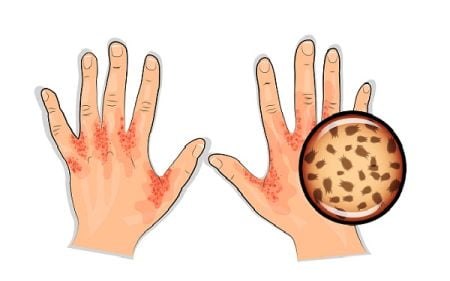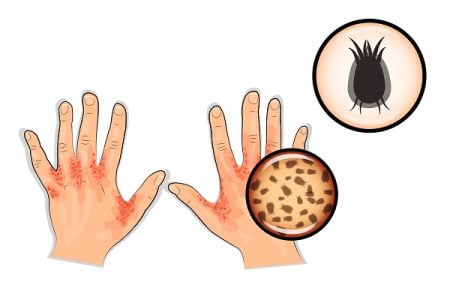Know About Scabies
- Updated on: Jun 25, 2024
- 5 min Read
- Published on Oct 3, 2019


What is scabies?
Scabies is one the most common yet neglected dermatological condition in the world. It is a highly contagious parasitic skin infestation caused by a mite called Sarcoptes scabiei var hominis. This mite, barely visible to naked eye, burrows into the epidermis (upper layer of the skin) where it lives and lay eggs.
The presence of mites triggers a host immune response in the form of intense itching and rash in the area of its burrows. The urge to scratch generally gets stronger at night. Itching is most severe in elderly and children.
Common places in the body where scabies mites live
Some of the most common places where scabies mites live on human body include:
- Between the fingers
- The folds of the wrist, elbow, or knee
- Around the waistline and navel
- On the breasts or genitals
- The head, neck, palm, face, and soles in very young children
Prevalence of scabies
Scabies infestation is prevalent worldwide and is very common. Scabies can affect people of all ages, races, and social classes. People who are more likely to get scabies include:
- Sexually active adults
- Prison inmates
- People in institutional care
- People living in crowded conditions
- People in childcare facilities
- People living in refugee camps
Scabies is highly contagious in nature and can spread quickly through close physical contact with the infested person. Sharing clothes, towels, and bedding can sometimes spread scabies.
What are the signs and symptoms of scabies? How does scabies look?
It can take up to six weeks for the symptoms to appear after the initial exposure to scabies.
Signs and symptoms develop more quickly in the person who had scabies before. It is important to remember that infested person can spread scabies during this time even if he/she doesn’t have any visible symptoms yet.
The hallmark symptoms of scabies include:
- Intense itching usually severe in nature which gets worse at night
- Pimple like irritation or a rash
- Thin, irregular burrow tracks made up of tiny blisters or bumps on your skin, which appears as 0.5–1.5 cm long grey irregular tracks in the web spaces between the fingers, on the palms and wrists. They may also be found on or in armpits, buttocks, penis, elbows, nipples, insteps and heels.
- Sores caused by itching
Children may have itching all over their body and do not feel to eat or sleep.
What are the causes of scabies?
Infestation with eight legged, microscopic female mite is the main cause of scabies in humans. The mite burrows into your epidermis and produces a tunnel in which it deposits eggs. After hatching of eggs, the mite larvae approach to the surface of your skin where they mature and can spread to other areas of your skin or to the other people.
Is scabies contagious? How do you catch scabies?
Close physical and intimate contact, sometime sharing bedding or clothing with an infected person spread the mites. The skin to skin contact must be long enough to enable mites to crawl from one person to other and simply a handshake or a hug doesn’t transmit scabies.
Adults often get scabies through sexual contact.
It is impossible for humans to have full blown scabies from animal scabies mites, though they can cause temporary skin reactions.
What are the risk factors for scabies? Are you at risk of scabies?
Scabies can infest any human being who comes in contact with the mites. The only risk factor for scabies is direct skin contact with a scabies infested person.
Even good hygiene and health practices can’t prevent scabies transmission if there is a close contact with an infected person. Very short contact in social or school setting is not likely to be sufficient for transmission of the mites.
This condition does appear in cluster, so outbreaks are sometime inevitable within a given community.
How is scabies diagnosed?
Scabies is identified by the presence of the hallmark signs of typical rash and continuous worsening itch, particularly at night.
Your doctor will be able to diagnose scabies simply by a physical exam and inspecting the affected area for rash and burrows caused by mites. In some cases, your doctor will confirm it by removing a mite from the infected area with the help of needle.
If he/she is not able to find out the mite easily, he/she may proceed for skin scrapping test. In this test, your doctor will scrap off a small section of skin (previously applied with a mineral oil) to obtain a tissue sample. This sample is then examined under a microscope to confirm the presence of scabies mites, their egg or their fecal matter.
What are the treatment options for scabies?
Treatment of scabies is rather easy with the administration of prescription scabicides– chemicals used to kill the scabies mites in cream or lotion form.
Home remedies have not been proved to be effective in this condition. Your doctor will usually instruct you to apply the medication all over your body from neck down to toe and leave it for at least eight hours or overnight.
Since mites are generally more active at night, your doctors instruct to use these medications at night.
Medications generally prescribed for scabies treatment include:
- 5 percent permethrin cream
- 25 percent benzyl benzoate lotion
- 10 percent sulfer ointment
- 10 percent crotamiton cream
- 1 percent lindane lotion
Doctors may prescribe Ivermectin, an oral medication, for people with compromised immune system or for people who do not respond to prescription lotion and cream.
These medicines may kill mites promptly, but you will have itching even after few weeks of the treatment. Contact your doctor if symptoms persist after four weeks of treatment.
Because of scabies contagious nature, your doctor will likely recommend group treatment for all family members or other close contacts even if they have no sign and symptom of scabies.
How can scabies be prevented?
The most important step for prevention of scabies is treatment of the person who got diagnosed with it and all their close contacts at the same time. You can prevent spreading the disease by:
- washing clothing, bed linen and towels in hot water and machine dry
- making sure family members and other persons who came in contact with an infested person get checked for scabies
- avoiding direct skin to contact with an infested person
- avoiding using unwashed bedding and clothing used by an infested person
What are the complications of scabies?
Scabies infestation is frequently complicated by secondary bacterial infections such as impetigo. The prolonged and intense scratching breaks the skin and makes it vulnerable to further bacterial infection which ultimately needs antibacterial treatment.
Impetigo is a superficial infection of the skin that’s caused most often by staphylococci bacteria or occasionally by streptococci bacteria. Systemic sepsis occurs if this infection reaches to the blood of the infested person.
Some people may develop another form of scabies, called crusted scabies also known as Norwegian scabies. It affects certain high risk groups including people with chronic condition affecting immune system such as HIV or chronic leukemia. This is more severe and extremely contagious type of scabies.
People with this condition develop thick and scaly crusts of the skin that contain thousand of mites and eggs.












